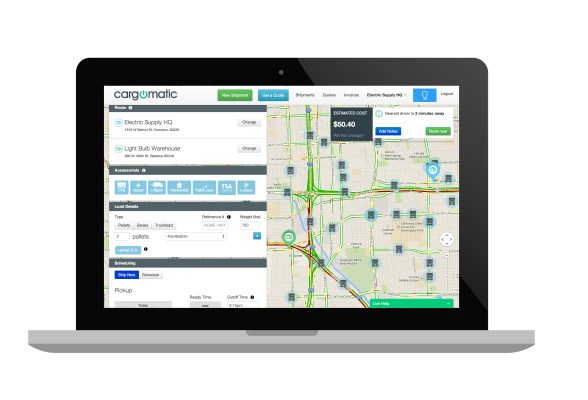Every day I hear about a new ‘Uber for X’ startup and most of them are pretty crappy, but every now and then one comes across my desk that’s actually pretty cool.
Los Angeles-based Cargomatic, which hopes to become ‘Uber for truckers,’ is one of the cool ones. And it just raised $8 million to expand its platform for connecting shippers and truckers who are available to help move their cargo.
Launched in 2014, Cargomatic hopes to bring some technology to the local trucking industry by providing a platform enabling shippers to list available jobs that local truckers with excess capacity can complete. By making the connection, the company hopes to not only help truckers make more money, but also to route shipping more efficiently.
The company has a website where companies can enter the details of cargo they need to ship, and a mobile app that can be used by truckers to accept jobs and track their routes.
Like other on-demand services, Cargomatic vets drivers who sign up, reviewing their commercial licenses and insurance to ensure they have everything they need to transport another company’s goods. It also provides pricing transparency by determining how much a driver should make based on the weight and distance of goods that they move.
Finally, the platform enables truckers to get paid more quickly by facilitating the invoicing and payments portion of the transaction. Shippers are asked to enter their credit card or ACH information, which Cargomatic uses to pay out truckers shortly after a job is completed.
Before platforms like Cargomatic, most companies that needed to move cargo mostly relied on a few local truckers that they knew, according to Cargomatic CEO Jonathan Kessler. But those truckers weren’t always guaranteed to have excess capacity. Meanwhile, truckers had to deal with uneven work schedules and driving for a limited number of shippers.
The company hopes to reduce that friction in the market by giving shippers a way to quickly get their goods shipped while also increasing income for truckers by making them aware of jobs that are available. Because it knows where truckers and available jobs are, it can also do more efficient routing to reduce the cost of transporting goods.
Cargomatic has been operating in Southern California and in the New York metro area, but it’s looking to expand. To do that, the company has raised $8 million led by Canaan Partners with participation from Volvo Group Venture Capital, Rob Estes of Estes Express, Morado Venture Partners, SV Angel, Sherpa Ventures, Structure Capital, Nicolas Berggruen, Scott Banister, Fritz Lanman and Hank Vigil.
That funding will be used to aid the company as it rolls out to new markets and brings on new drivers. Having Canaan on board should help, as the firm has invested in a number of marketplace startups and generally understands the dynamics involved in making them successful.
Kessler believes having Volvo’s venture group invested could provide some side benefits in helping it market to truckers. Another notable investor is Estes, who is the owner of the largest private trucking company in the U.S.
Of course, having money is good and having investor help is better, but Cargomatic hopes to succeed mainly because it’s solving a big problem. The local trucking industry is a $70 billion opportunity, after all. Cargomatic just wants a small piece of that.
